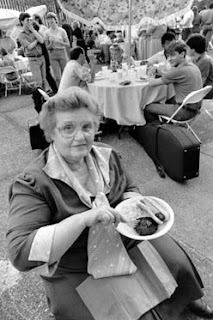"What do I tell my mom about Scott?" I asked my friend Julie at breakfast a few weeks later.We huddled over our trays in a quiet corner of the cafeteria. Scott had left the table to practice for the week's orchestra challenges. He was determined to retain the principal viola chair.
"What do you mean?" Julie looked at me quizzically, her brown eyes magnified through thick lenses. "You're already concertmistress of World Youth Symphony Orchestra; you aced the solo competition; Van Cliburn shook your hand after his guest appearance, and Scott Woolweaver, your boyfriend, is the cutest and most talented guy at Interlochen. It's so neat, Margie. You've got it all. What more could a mother ask for? Won't your mom be happy for you? I mean, mine would be dancing cartwheels."
I sipped from the straw of my milk carton. "You don't know her, Julie—she's, well—"
"Well, what?" Julie's face darkened.
"Sort of intense." I took a final sip and crumpled the carton. "Julie, the truth is, he's my first."
"Listen, Margie, if I were you—"
"Yeah?"
"Just call your parents tonight before they show up here for Visitor's Day. Tell your mother that you've fallen in love. She's gotta understand that passion and music go together, right? How can you be a true artist without emotions?"
I sighed heavily like my mother would do. "Sure," I said, finally.
♭♩ ♬♮♬ ♯♪♮♩ ♯♬ ♮♩ ♫ ♯♪♭♩
"Daddy, I need to talk to Mom," I said cupping the mouthpiece. I could hear my father flick a match for his cigarette.
"Frances, pick up the kitchen phone. It's the little pisher Margie calling collect, so hurry. We'll stay on the line together. That way she'll have us both."
"Maahgie!" My mother panted into the phone. "How's my dolly?"
"Okay. Good."
"I've been so concerned. Those cabins can be awfully chilly at night. Is your sleeping bag warm enough?"
"Yeah, Mum, it's fine."
"Are you getting enough fruits and vegetables?"
"I guess."
"We made the right choice sending you to Interlochen," said my mother. "So tell us, how does it feel to be concert mistress of the World Youth Symphony Orchestra? You won the concerto competition with that difficult, difficult Paganini. Did you play the cadenza?"
I didn't have time to respond before my father blurted, "We read about you in The Salem Evening News!"
"What?"
My father took a drag of his cigarette. "I bought—how many, Frances—ten copies? Enough to show customers at Kransberg's, my brothers, and of course, your Auntie Irene. God bless her. She keeps every newspaper article about you."
"Look, Mum—" I opened the door to the phone booth a crack for air.
"Dolly? What is it? Your voice sounds different. What's the matter? Tell Mummy."
I wracked my brain for Julie's exact words and spoke with quiet deliberation. "I'm sure you'll be happy for me. I have a ..."
My throat constricted.
"Dolly, what did you say? Did you hear anything, John? Did the operator cut us off all ready?"
"Boyfriend." I said, getting it over with.
No response. "Hello?"
I heard them mutter something.
"A boyfriend?" asked my mother. "We sent you to Interlochen to fool around with the opposite sex? When do you manage to find time?"
"There was a dance, Mum. It's just normal at my age, you know, girls and boys—"
"So, tell me. This boyfriend of yours. He doesn't maybe interfere with your studies?"
"Oh no! Scott practices his viola every single day. He inspires me."
"John, are you hearing this? Say something."
"Whaddya want me to say, Frances?" My father expelled with such force that I imagined cigarette fumes wafting from the receiver.
I heard my mother clear her throat before launching into the dreaded questions. "So tell me, Marjorie Jill, what's the young man's name?"
"Scott."
"That's his first. What's his last?"
"Woolweaver," I whispered, the cord wrapped so tightly around my finger that the nail had turned almost white.
"Jewish?" she asked.
The sound of a gong announced the end of three minutes. I heard the operator's voice. "Would you like to continue this call?"
"No," my father rasped. "Frances, hang up the phone."






